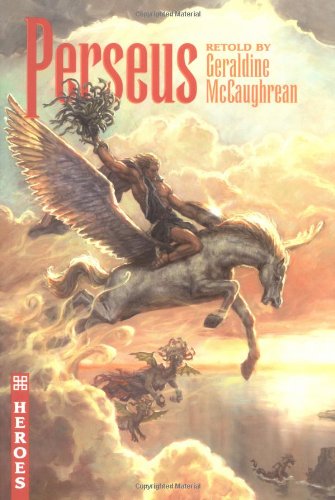
 Perseus by Geraldine McCaughrean
Perseus by Geraldine McCaughrean
There are probably much shorter retellings of this hero-story, and there are probably quite a few longer ones — but if you wish to avoid the simplicity of a picture book and the long-windedness of an epic, then I don’t think you’d find any reason to complain about Geraldine McCaughrean‘s version of the Perseus myth. In fact, I would go so far as to say that its fidelity to the well-known myth and the lyrical prose in which it is told make it the quintessential retelling of the ancient story (perhaps a premature claim considering I’m far from having read them all, but this would surely be up there in the top five!).
King Acrisius foolishly asks the Epidauran Oracle how he will die, and gets a devastating answer: it will be at the hands of his own grandson. Inevitably, he takes pains to ensure that his daughter Danae will never beget a child, by locking her up in a specially-designed tower. Just as inevitably, this attracts the attention of Zeus, the king of the gods… and a few months later Danae gives birth to a son: Perseus.
Horrified, Acrisius sets mother and son adrift on the sea in a wooden chest, only for them to be rescued by a fisherman and introduced to the King Polydectes. Coveting the hand of beautiful Danae, Polydectes sets her son an impossible task in order to pursue his reluctant bride without inference. Perseus is tricked into bringing back the head of the Gorgon Medusa — but you don’t need me to tell you how this particular quest will pan out.
In fact, (though no fault of McCaughrean herself) this is one of the inevitable weaknesses of the book: you already know what’s going to happen! When Perseus discovers exactly who and what the Medusa is, I thought to myself: “wait — how can he not know that already?” The myth of Medusa is so well-known, it seems strange that anyone (even the characters in her story) wouldn’t know about her! But of course, I was reading from the point of view of a person who has known these stories for years. For a young reader just discovering the world of Greek myth, this is the perfect way to introduce them.
McCaughrean takes us through all of Perseus’s adventures: his encounters with the hideous Graeae and the beautiful nymphs, the accumulation of his god-given weaponry, his confrontation with Medusa and her sisters, his meeting with the Titan Atlas, the rescue of the beautiful Princess Andromeda from the sea-serpent, and the conclusion of his grandfather’s long-awaited fate. Speaking of fate, McCaughrean weaves in an underlying theme of the immutability of fate and the despair that this can cause, yet manages to add in a glimmer of the hope that comes with free choice by the story’s end.
McCaughrean retains the sensuality that is so prevalent in Greek myths, without making it all too obvious (such as Danae’s union with Zeus as he appears as falling gold through her window):
Coins and ingots and gold dust pelted her like hail so that she reeled and fell on her back and drew up her knees and cried out in fright. But it was not unpleasant — just a little startling.
Likewise, the author’s prose throughout the story is wonderfully poetic and descriptive, from the beauties of Mount Olympus to the horror of the gorgons. It’s quite reminiscent of Rosemary Sutcliffe, actually.
The tone shifts mid-way through the story, from the grim seriousness of Perseus’s youth and the fight with the Gorgons to a lighter and more comic confrontation with Andromeda’s people (the poor girl is tied up naked to a rock on the shore, having to listen to Perseus muse about whether she’d like to marry him: “Sir! I would marry your horse if it would save me from being eaten!”). McCaughrean was probably wise to write “love at first sight” with a touch of tongue-in-cheek.
I read Perseus in one sitting, and felt that although it was a story well-known to me, I had experienced it in a new, refreshing light. For any young person just beginning to get interested in the world of myth, this would be the book to get (along with McCaughrean’s other retellings of Greek heroes: Hercules, Theseus, and Odysseus).
Greek Heroes — (2003) Ages 9-12. Publisher: What makes a hero different from ordinary men? Are courage and strength enough, or is there something more that’s needed for battle, whether against a fearful monster or the wrath of the gods themselves? Here are the stories of four heroes, Perseus, Hercules, Theseus, and Odysseus, who follow the path of glory in their many unforgettable adventures. Geraldine McCaughrean is a master storyteller and she excels in combining nail-biting plots with a powerful portrayal of the main characters in all their complexity, their matchless strength and wit tempered by human weakness. The result is a collection of deeply satisfying and mesmerizing stories that will be an excellent addition to any bookshelf.







Do it! One of the best things I've read in recent years.
This reminds me. I want to read Addie LaRue.
We’re in total agreement David!
I felt just the same. The prose and character work was excellent. The larger story was unsatisfying, especially compared to…
Hmmm. I think I'll pass.